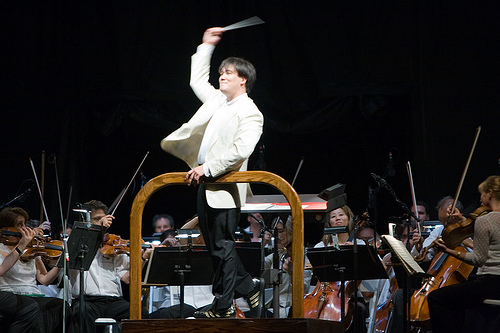 Alan Gilbert makes his debut tonight as the New York Philharmonic‘s music director. I wish him the very best of luck.
Alan Gilbert makes his debut tonight as the New York Philharmonic‘s music director. I wish him the very best of luck.
Here’s part of what I wrote about his appointment in Commentary when it was announced two years ago. I haven’t changed my mind since then.
* * *
If you care about the continuing fate of symphony orchestras, museums, ballet, opera, and theater companies, and all the other costly institutions that were the pillars of American high culture in the twentieth century, you must accept that these elitist enterprises cannot survive without the wholehearted support of a non-elite democratic public that believes in their significance.
Leonard Bernstein and Beverly Sills apprehended this, and did something about it. Perhaps more than any other American classical musicians of their generation, they did their best to communicate to ordinary middle-class Americans the notion that the fruits of high culture are accessible to all who make a good-faith effort to understand them. While that may not be strictly or wholly true, it is largely true–and an ennobling idea. I would not be greatly surprised if Sills in particular is remembered for delivering this message long after the specifics of her performing career are forgotten.
Alas, the message has to a considerable extent been forgotten by the orchestra that Bernstein led. To be sure, the New York Philharmonic, like all American orchestras, works hard at cultivating new audiences–but since Bernstein’s time, its efforts in this direction have rarely involved its music directors. Neither Kurt Masur nor Lorin Maazel made any serious attempt to reach beyond the purview of their regular duties to communicate the significance of classical music to a mass audience. Like most conductors of their generation, they saw their job as purely musical, and took for granted that its value would be appreciated by the larger community they served.
Alan Gilbert will not have that luxury. Instead, he must start from scratch. He must realize, first of all, that mere exposure to the masterpieces of Western classical music does not ensure immediate recognition and acceptance of their greatness–least of all when those doing the exposing make it clear that they expect young audiences to like what they are hearing, on pain of being dismissed as stupid.
This condescending attitude is part of the “entitlement mentality” that has long prevented our high-culture institutions from coming fully to grips with the problem of audience development. Too many classical musicians still think that they deserve the support of the public, not that they have to earn it. One of the signal virtues of America’s middlebrow culture was that for the most part it steered clear of this mentality. Its spokesmen–Bernstein foremost among them–believed devoutly in their responsibility to preach the gospel of art to all men in all conditions, and did so with an effectiveness that our generation can only envy.
I sincerely hope that Alan Gilbert will prove to be a great conductor. But I have no doubt that it is far more important to the future of classical music in America for him to be a great communicator, one who finds new ways to do what Leonard Bernstein did so superlatively well in the days of the middlebrow. And I suspect that his will be the harder task: to make the case for high culture to a generation that is increasingly ignorant, if not downright disdainful, of its life-changing power and glory.
Terry Teachout on the arts in New York City
An ArtsJournal Blog
